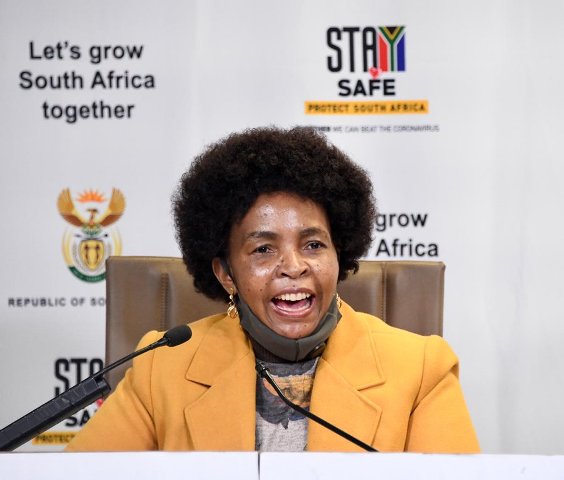Everyone must play part in ending GBVF
The launch was attended by aspiring and well-established female entrepreneurs who exhibited their goods and services.

- Country:
- South Africa
Minister in the Presidency for Women, Youth and Persons with Disabilities, Maite Nkoana-Mashabane, has reminded citizens to play their part in ending gender-based violence and femicide (GBVF).
“Ending GBVF is a 365-Days Campaign and everyone must play their part. It is about collective responsibility and accountability,” said Nkoana-Mashabane who also urged citizens to help support victims of the pandemic.
Nkoana-Mashabane made the call as the department brought to a close the International 16 Days of Activism for No Violence against Women and Children Campaign, which took the form of a Men's Conference held at Ditsobotla District, in the North West, on Saturday.
The 16 Days of Activism Campaign is a United Nations-endorsed international initiative that runs annually from 25 November (International Day of No Violence against Women) to 10 December (International Human Rights Day).
The campaign sets out to focus global attention on the worldwide pandemic of violence against women and children.
Nkoana-Mashabane highlighted that this year, the South African government launched the campaign under the theme “Socio-Economic Rights and Empowerment to build Women’s Resilience Against Gender-Based Violence and Femicide: Connect, Collaborate, Contract.”
The launch was attended by aspiring and well-established female entrepreneurs who exhibited their goods and services.
“Advocacy initiatives to promote economic emancipation of women and empowerment to leave abusive relationships took place throughout the campaign and will continue, as it is linked to the core work of the department,” Nkoana-Mashabane said.
The Minister also hosted a consultation on Enforcement of Maintenance Act Against Child Maintenance Defaulters, which was held in Polokwane to address the economic harm borne largely by women due to unpaid child maintenance.
A Presidential Summit on Economic Empowerment of and for Persons with Disabilities also took place on 7-8 December 2022 in Gauteng to discuss measures to elevate the economic status of persons with disabilities, particularly women, who as statistics show, are more economically vulnerable when compared to women without disabilities.
Furthermore, the department supported provincial and community-led GBVF initiatives, which includes the formation of Violence Free Zone Campaigns in KwaZulu-Natal.
Nkoana-Mashabane said the department is currently facilitating Provincial Youth and Substance Abuse Dialogues in order to address the contributing factors to the scourge of violence in the country.
“The next leg will take place in Mthatha, Eastern Cape, on 13 December 2022. Young women experience high levels of violence and alcohol and substance abuse is a contributing aggravating factor when perpetrators turn to violence.
“The department also welcomes the resolutions of the Presidential Summit on GBVF 2, which took place on 1-2 November 2022. The resolutions sets out immediate priorities that need addressing by various stakeholders in ramping up our efforts in realising the outcomes of the National Strategic Plan on GBVF (NSP-GBVF),” the Minister said.
The NSP aims to provide a multi-sectoral, coherent strategic policy and programming framework to strengthen a coordinated national response to the crisis of gender-based violence and femicide by the government of South Africa and the country as a whole.
The strategy seeks to address the needs and challenges faced by all, especially women across age, sexual orientation, sexual and gender identities; and specific groups including elderly women, women who live with disability, migrant women and trans women, affected and impacted by the GBV scourge in South Africa.
(With Inputs from South African Government Press Release)
- READ MORE ON:
- Maite Nkoana-Mashabane
- gender-based violence and femicide









